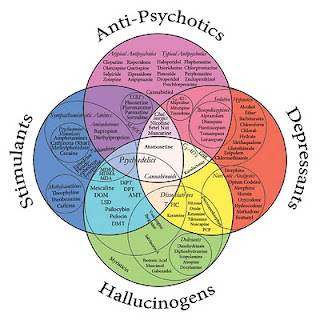An interesting entry at the Neuroskeptic blog:
It's a long and slightly rambling article, but Dean's central point is pretty simple. The medical/biological model of psychiatry assumes that there are such things as psychiatric diseases. Something biological goes wrong, presumably in the brain, and this causes certain symptoms. Different pathologies cause different symptoms - in other words, there is specificity in the relationship between brain dysfunction and mental illness.
Psychiatric diagnosis rests on this assumption. If and only if we can use a given patient's symptoms to infer what kind of underlying illness they have (schizophrenia, bipolar disorder, depression), diagnosis makes sense. This is why we have DSM-IV which consists of a long list of disorders, and the symptoms they cause. Soon we'll have DSM-V.
The medical model has been criticized and defended at great length, but Dean doesn't do either. He simply notes that modern psychiatry has in practice mostly abandoned the medical model, and the irony is, it's done this because of medicines.
If there are distinct psychiatric disorders, there ought to be drugs that treat them specifically. So if depression is a brain disease, say, and schizophrenia is another, there ought to be drugs that only work on depression, and have no effect on schizophrenia (or even make it worse.) And vice versa.
But, increasingly, psychiatric drugs are being prescribed for multiple different disorders. Antidepressants are used in depression, but also all kinds of anxiety disorders (panic, social anxiety, general anxiety), obsessive-compulsive disorder, PTSD, and more. Antipsychotics are also used in mania and hypomania, in kids with behaviour problems, and increasingly in depression, leading some to complain that the term "antipsychotics" is misleading. And so on.
So, Dean argues, in clinical practice, psychiatrists don't respect the medical model - yet that model is their theoretical justification for using psychiatric drugs in the first place.
He looks in detail at one particularly curious case: the use of atypical antipsychotics in depression. Atypicals, like quetiapine (Seroquel) and olanzapine (Zyprexa), were originally developed to treat schizophrenia and other psychotic states. They are reasonably effective, though most of them are no more so than older "typical" antipsychotics.
read more


Geen opmerkingen:
Een reactie posten